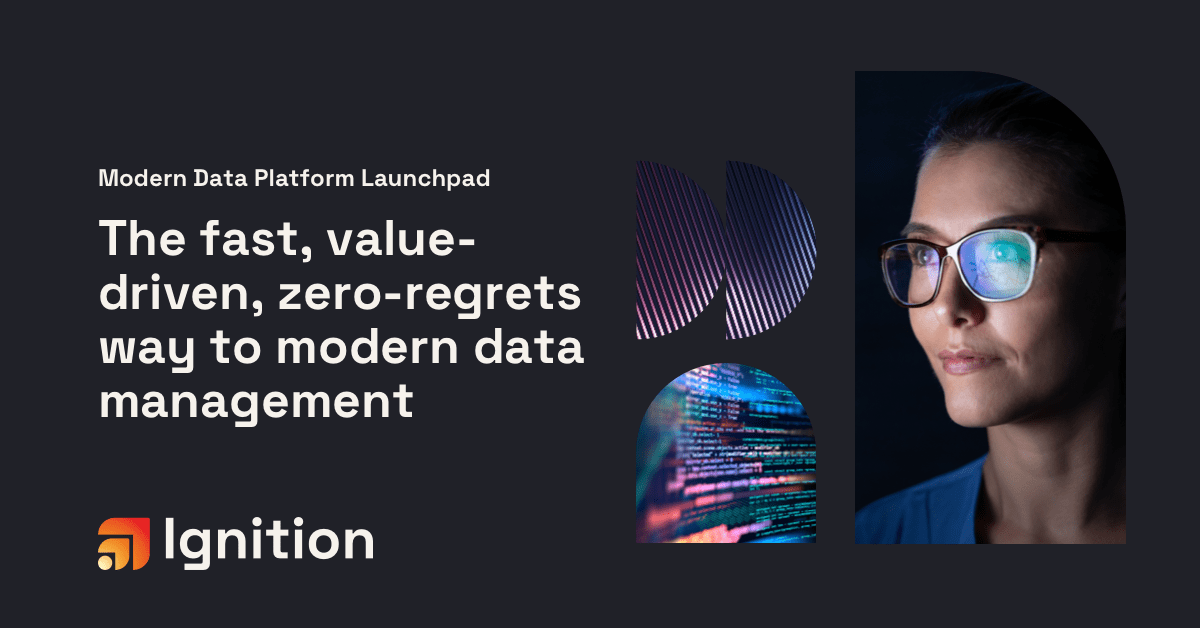Get a free report of your organisation's data maturity level - Learn more
Steve Rose | 15 August 2024

In an era where data is the lifeblood of businesses, Modern Data Platforms have emerged as the cornerstone of effective data management and utilisation. These platforms represent an architectural framework and best practices standards that can be delivered through a variety of technology options, offering the utmost flexibility and data accountability. Modern Data Platforms provide many benefits compared to traditional data management approaches, and organisations that do not embrace these new frameworks and standards risk being left behind.
Here are the top seven reasons why you need a Modern Data Platform.
One of the central tenets of Modern Data Platforms is the comprehensive journey that data undergoes. This encompasses data pipelining, transformation, cleansing, and presentation, resulting in reusable data products ready for business consumption. Effective data integration is essential to the success of this process. Modern Data Platforms are designed to collect data from diverse sources, including databases, spreadsheets, external systems, and real-time feeds. The data is then pipelined through a series of processes that standardise and harmonise it. This data integration strategy ensures data accuracy and consistency, fundamental aspects of a Modern Data Platform.
The flexibility of data transformation is a crucial feature of Modern Data Platforms, allowing businesses to adapt to changes in source data schemas. Data can be transformed at the point of ingestion or post-ingestion, allowing for seamless adjustments. This flexibility is particularly valuable as businesses evolve and their data requirements change. Data transformation can occur in real-time or through batch processes, ensuring the data remains relevant and useful. Modern Data Platforms provide a range of tools and techniques for data transformation, ensuring that data is prepared as needed for various business purposes.
Modern Data Platforms excel at accommodating a wide array of data types and feeds. This is crucial for handling the multifaceted nature of data in contemporary business environments. Data is not limited to structured formats but includes unstructured and semi-structured data. Furthermore, data arrives in different forms, such as real-time data from sources like SCADA systems, near-time data through APIs and micro-batches, and traditional batch feeds. The ability of Modern Data Platforms to ingest and process this diverse data ensures that businesses can work with the information they need, regardless of its format or delivery mechanism.
Maintaining data lineage and metadata is an essential aspect of Modern Data Platforms. These platforms ensure that data retains its source-aligned characteristics as it moves through the various components of the platform. Comprehensive lineage and metadata are preserved, allowing businesses to trace the origin of data and understand its transformation journey. This feature is invaluable for data accountability, compliance, and quality assurance. It also facilitates data auditing and troubleshooting, enabling businesses to address issues or discrepancies effectively. With Modern Data Platforms, organisations have a clear and structured view of their data, from source to consumption.
Modern Data Platforms are designed to scale according to the needs of the business. This scalability is a crucial feature, allowing organisations to establish a centralised, unified, and fully integrated corporate memory. As data volume grows, the platform can expand to accommodate the increased load. Scalability also ensures that complex relationships between data entities, often called business keys, can be preserved and managed efficiently. This unified corporate memory becomes a valuable asset for businesses, providing a consolidated view of data and enabling comprehensive analysis and decision-making.
Implementing a Modern Data Platform requires a robust data governance framework and security measures. These platforms often deal with sensitive and critical data, making data security and compliance a top priority. Security features, such as encryption, authentication, and authorisation mechanisms, are integral to Modern Data Platforms. Additionally, they enforce data validation rules, referential data integrity constraints, and other mechanisms to prevent data corruption and ensure data accuracy, completeness, and reliability. A well-defined data governance framework is crucial for meeting regulatory compliance standards. It ensures that data is organised, accessible, and auditable, making it easier to demonstrate compliance with regulations. Modern Data Platforms empower organisations to implement strong data privacy measures consistently.
While traditional approaches to data management require a significant upfront investment, take a long time to implement and limit scalability, it is possible to start small with Modern Data Platforms and scale over time. Approaches like Ignition’s Modern Data Platform Launchpad offer a zero-regrets way to get started. The Launchpad enables teams to generate initial insights and reports quickly, paying only for what is being used. Over time, the Modern Data Platform can grow into an enterprise-wide analytics and AI platform – without any rework or redesign.
In conclusion, adopting a Modern Data Platform is a strategic move for businesses aiming to thrive in the data-driven landscape. These platforms offer the flexibility and data accountability necessary to manage and utilise data effectively, and approaches like the Modern Data Platform Launchpad offer a quick, zero-regrets way to get started. 